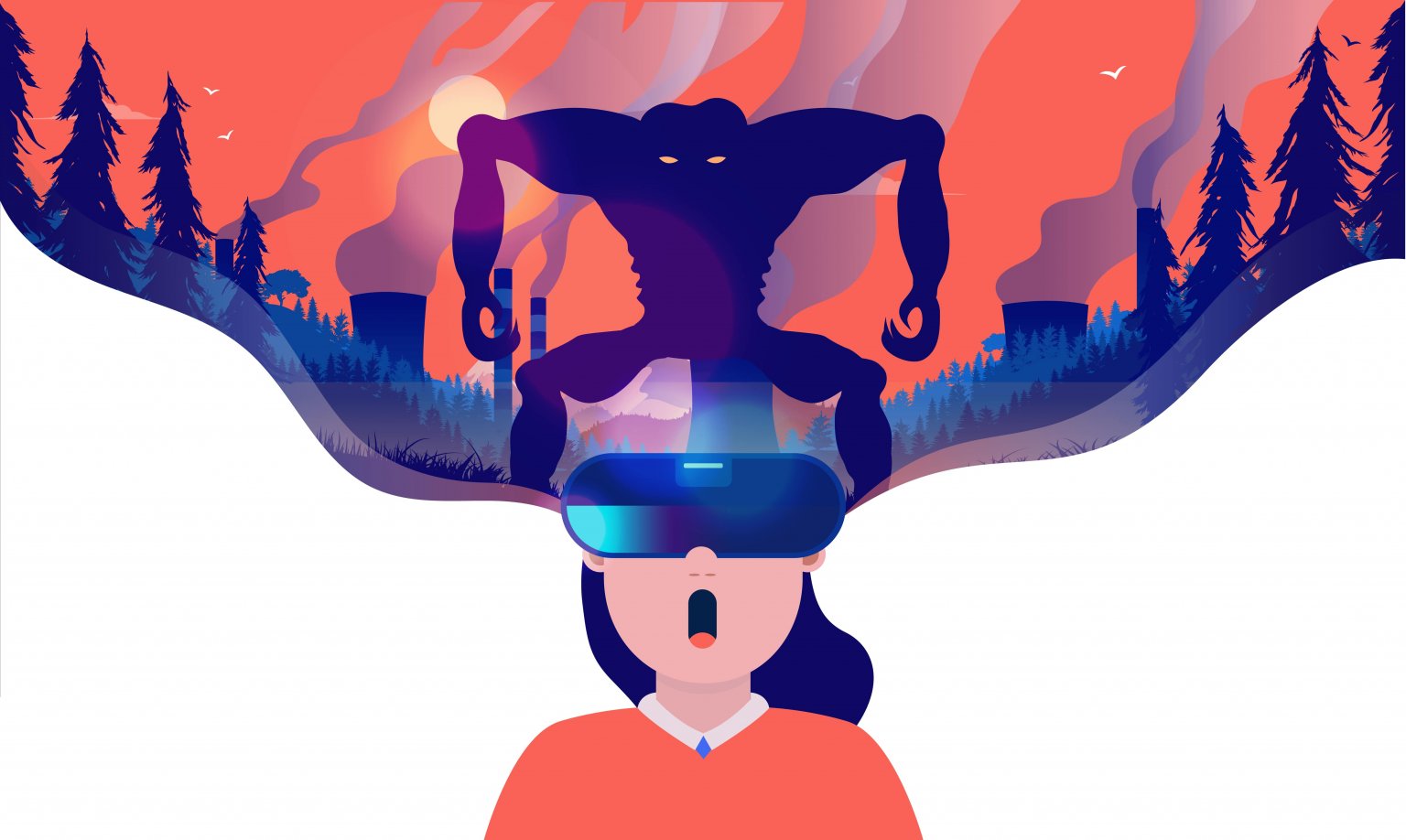Mental health struggles have become a major concern, taking the top spot as the main cause of illness and disability globally, as highlighted by a recent World Health Organization (WHO) study. Despite the significant impact of mental health challenges, a great portion of individuals, ranging from 30% to 80%, choose not to seek treatment. This decision often stems from issues like stigma, lack of awareness, financial constraints, and the struggle to balance treatment with work and school commitments.
Now, let’s talk about the metaverse, a digital world filled with social media, gaming, shopping, digital art, real estate, and investments. It holds the potential to influence our reality, presenting both positive and negative implications for mental health. But we might be getting a bit too excited about its impact right now and might not fully grasp its long-term effects. This is where we look into the big question: how will the metaverse play into the ongoing global mental health crisis?
Mark Zuckerberg got us all buzzing in 2021 about the metaverse, envisioning a new era for the internet. Defined by a “deep feeling of presence,” this multi-sensory journey in every place and moment is anticipated to revolutionize communication and social connections. However, as the metaverse concept gains momentum, questions arise about its potential role in mental health epidemiology.
In this article, we will explore the connection between the metaverse and mental health. We will look into it’s opportunities, challenges, and what it might bring to our overall well-being.
Table of Contents
Background
Since the 1990s, virtual reality (VR) has made significant inroads into mental health research. Rothbaum conducted a groundbreaking study on acrophobia among college students, laying the foundation for exploring the efficacy of VR exposure therapy for anxiety disorders.
Building on this foundation, over 127 clinical studies have looked into VR interventions for various anxiety disorders. These include specific phobias, social anxiety, PTSD, and panic disorder, utilizing sophisticated VR-based cognitive-behavioral therapy.
Systematic reviews indicate that VR therapy surpasses imaginal therapy in effectiveness and matches in vivo exposure therapy. Beyond anxiety, VR has extended its reach to psychotic disorders, substance use treatment, eating disorders, forensic psychiatry, and depression treatment, albeit to a lesser extent.
The metaverse holds promise for making mental health treatment accessible, cost-effective, and complementary to medications, therapy, and procedural psychiatry.
While progress is evident, widespread implementation of extended reality (XR) in regular medical and psychiatric clinical practice remains limited. Addressing challenges, such as demonstrating cost-effectiveness and efficacy, conducting high-quality research studies, expanding treatment indications, and addressing training gaps and technical obstacles, is imperative.
Psychiatry, particularly non-invasive brain stimulation, stands out as a promising use case for XR tools. AR-based neuronavigation could enhance precision targeting in neuromodulation treatments like transcranial magnetic stimulation (TMS).

Benefits
By 2026, an estimated 25% of the world’s population is projected to spend a minimum of one hour daily in the metaverse, marking a significant shift in how people engage with this virtual space.
Affordable Care
The metaverse introduces a revolutionary approach to accessible and affordable healthcare. Institutions can sidestep the hefty fees associated with land acquisition and building construction. Although establishing a specialized metaverse initially incurs substantial costs, the long-term financial burden diminishes. It enables patients to access care at their convenience.
Architectural Influence
Avatars in healing environments within the metaverse can transfer that healing energy to individuals. Studies affirm the transfer of nature-based virtual reality benefits from the virtual space to the real person. Architectural principles and interior design play a crucial role in mental health. It offers the possibility for institutions to flexibly adapt their virtual architecture and create customizable environments.
Consciousness Transformation
Virtual reality serves as a tool to induce non-ordinary states of consciousness. Evidence supports the positive impact of mindfulness and transcendental meditative states on genetic and cellular levels. The metaverse can incorporate art that induces altered states of consciousness, aligning with the therapeutic benefits observed with substances like psychedelics.
Digital Phenotyping
Metaverse interactions act as a unique form of digital phenotyping, customizing care for individual users by understanding their variables. As personalized medicine gains prominence, the metaverse enables individuals to store their data and receive personalized interventions, including therapeutic art matched to their preferences.
Safe Haven for Social Anxiety Disorder
Interactions through avatars in the metaverse demonstrate promise for reducing social anxiety. This virtual context may motivate individuals to engage more freely with others, particularly those with public speaking apprehensions, by providing a less anxiety-inducing, avatar-represented presence.
Challenges
Here are a few possible risks of the metaverse for mental health:
Harassment
One significant issue with virtual reality is harassment, of which bullying is a prime example. While online harassment is extensively studied, the virtual reality setting introduces a unique dimension. Interacting through avatars means users mirror movements, effectively replacing their physical bodies. Aggression towards avatars can trigger an instinctive perception similar to a real physical attack. A recent study interviewing 31 female users of social virtual reality platforms revealed the heightened impact of harassment due to the illusion of physical presence, emphasizing the necessity for preventive measures.
Addiction
Another challenge involves addiction to virtual reality applications, such as games or social platforms. The hypothesis posits that increased presence sensation amplifies realism, subsequently enhancing psychological reward and addictive potential. A recent study, involving 750 users of virtual reality applications, found no higher prevalence of addictive behaviors compared to users of traditional video games or social media. However, a correlation was identified between a strong feeling of embodiment (the belief that the avatar represents their real body) and addiction symptoms. This suggests that users experiencing a heightened sense of embodiment may be at a higher risk of developing addictive behaviors.
Practical Implementation
Applying the metaverse to mental health isn’t just an idea; it’s happening in real life too.
Assisting Children with Autism
In 2022, scientists conducted a trial implementing a metaverse-based program to enhance social skills in boys aged 7–12 with autism with some support needs. The findings demonstrated the program’s feasibility by improving social interaction skills, enhancing mental health outcomes, reducing emotional and behavioral problems, and alleviating parental psychological distress. Additionally, researchers highlighted its capability to overcome the limitations of traditional offline training.
Therapeutic Sessions
XRHealth, a virtual clinic, is a noteworthy example of employing the metaverse in therapy. Therapists and clients create avatars and convene in 360-degree virtual rooms, enabling physical engagement exercises such as ball activities. Another initiative is the MetaMental platform by Plutonic, offering U.S.-based patients access to virtual safe spaces, immersive therapies, peer-to-peer support, talk therapy learning, and group therapy sessions within the metaverse. These implementations showcase the practical application of the metaverse by professionals in the realm of mental health.
As we venture further into this transformative space, thoughtful consideration, ethical guidelines, and ongoing research will be essential to maximizing the metaverse’s benefits while safeguarding the well-being of individuals in the digital world.
Whether it’s developing virtual clinics or immersive therapy applications, we’re here to craft customized solutions. Reach out today and let’s shape a digitally inclusive and mentally enriching metaverse together.
FAQs
- How does the metaverse impact sleep and overall mental well-being?
Extended exposure to virtual environments may affect sleep patterns, especially due to blue light exposure and overstimulation. It is important to consider how virtual interactions might contribute to stress, anxiety, or digital fatigue, which could impact overall mental well-being.
- Can metaverse therapy replace traditional mental health treatment?
While the metaverse offers accessible therapy options, it is not a complete replacement for in-person care. Some conditions require direct medical supervision, physical assessments, or face-to-face therapy that virtual settings cannot fully replicate.
- What privacy concerns arise when using mental health services in the metaverse?
Since virtual therapy sessions involve storing sensitive data, users should be aware of security risks. Data breaches, unauthorized access, and digital tracking could pose risks to personal mental health records and private conversations.
- How can individuals set boundaries to prevent metaverse overuse?
To avoid excessive immersion, individuals should set screen time limits, take breaks, and balance virtual interactions with real-world socialization. Awareness of metaverse addiction risks is crucial for maintaining mental and emotional health.
- What steps are being taken to make metaverse mental health services accessible to diverse populations?
Efforts are being made to offer multilingual support, affordable therapy options, and adaptive technologies for people with disabilities. However, internet access, digital literacy, and cost barriers still need to be addressed for wider accessibility.



















